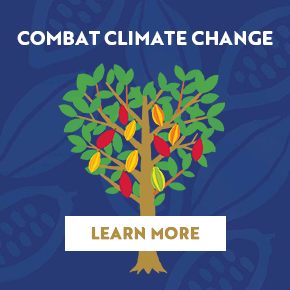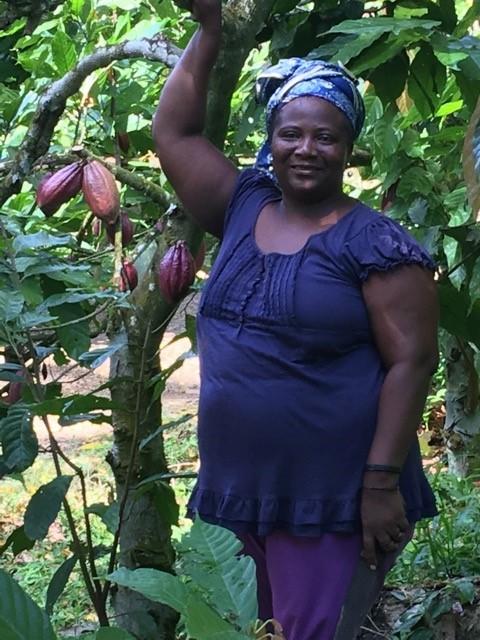Hortência is a cocoa farmer from Monte Bello, a small farming community south of São Tomé town, deep in the tropical rainforest. Hortência, whose name rather appropriately means ‘gardener’, has approximately 3.5 acres of cocoa trees, and nearly 1.5 acre growing pepper.
She is married to Manuel Silva Pina who also has his own land, which he divides just like Hortência, mainly between cocoa and pepper. They have known each other since they were children, and together they have six children ranging in age from 18 to 31. One is a teacher, and two are in Cape Verde studying renewable energy.
Hortência has known how to farm the land since she was young, and she properly started farming in 2007. Since joining CECAQ-11 she has experienced many benefits, both for herself personally and for her community. She has been trained in a variety of farming skills including grafting new seedlings, pruning, and shade management. She now trains others, including her own children.
Through CECAQ-11, she has all the new seedlings she needs. “My trees are getting old, and I am able to replace them with new ones which we have grafted to create better hybrids that are more productive, and start fruiting after only two years”.
With their income, she and her husband have been able to build their own house, purchase a motorbike (the transport of choice for most people in São Tomé), and send their children to school.
Hortência has been very proactive in getting involved with her community and with the co-op. She was elected Secretary of her local association and also heads up the local women pepper farmers’ group. She is now employed by CECAQ-11, previously as management treasurer, and now as the head of logistics.
It is Hortência who organizes all the inputs for all the member associations, as well as their rakes and other equipment. She arranges for everything to be transported to the villages, as well as picking up cocoa from the associations, which each have a collection point.
Hortência is most passionate about empowering women and helping to protect them against domestic abuse, which is a problem amongst farmers. She explains that the parcelling out of land has had a lot to do with it.
“Some years ago the Government more formally divided land between the farmers – which was good news, except they only handed out one land title per married couple. So, although both the man and the woman may have land, there is only one land title, and the husbands are often bad at sharing the income, even when they are both equally working the land. And this leads to a lot of conflict.”
Luckily, Hortência’s husband Manuel is a good husband, she says, so they have not fought over land or income. But -- Hortencia wanted to stand up for her fellow women farmers who were losing out to their husbands and experiencing a lot of abuse in the family home. In 2013, she took the problem to the Government.
“You did a good thing,” she communicated. “But you did it the wrong way! The way you’ve handed out the land has led to women being mistreated. You – the Government – are enabling mistreatment! Before, it wasn’t so bad.”
According to Hortência, the Government was surprisingly quick to respond, giving all the women that Hortencia had gathered together their own individual land titles. Things are now better for those women, but Hortência still worries for those who were too timid to join with her.
“I need to help them, too,” she says. “There is now a formal Ministry of Labour, and it has made it clear that women can go to them and make their claims, and they will respond.”
Hortência says there is a job to do to help sensitise other women about this issue and advise them what to do. “There are many women still suffering from their husbands,” she says. “I want to help them, but I would like more support.”
In Monte Bello there are 60 farmer members, 22 of whom are women. When it comes to empowering women farmers, Hortência agrees that CECAQ-11 is good at encouraging women to more fully participate in the co-op, but not all of them want to, or really think that they can.
Hortência has little time for this view, and she is adamant that all women could take part more -- and that it would benefit them to do so. “If more women got involved it would make them more active, and it would make sure more actually got done!” she says. She wants more women to encourage their fellow women farmers to do more.
One thing is for sure, Hortência is a great example of what is possible.






